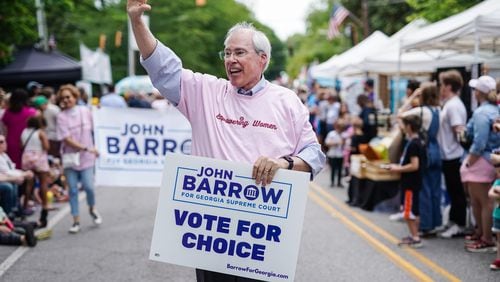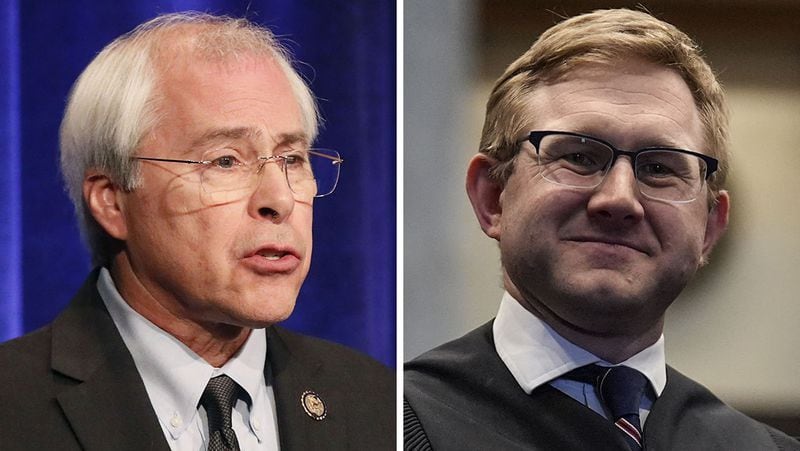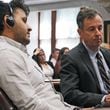Georgia Supreme Court candidate John Barrow could face formal charges for judicial misconduct, which could lead to his removal from the bench if elected, following a federal judge’s ruling regarding Barrow’s campaign focus on abortion rights.
Barrow, a former Democratic U.S. Congressman, is challenging Justice Andrew Pinson, who was appointed to the state Supreme Court by Gov. Brian Kemp in 2022. It is this year’s only contested race for a seat on the state’s highest bench.
Members of the Georgia Judicial Qualifications Commission privately asked Barrow to bring his campaigning in line with the Georgia Code of Judicial Conduct following a complaint over Barrow’s abortion-related statements. The agency says it’s not proper for Barrow to seek votes by promising to protect abortion rights, especially as a challenge to Georgia’s anti-abortion legislation is likely to again come before the state Supreme Court.
Barrow sought a temporary restraining order against the JQC members, citing his free speech rights under the U.S. Constitution, publicizing their warning in the process. He asked U.S. District Judge Michael L. Brown to stop them from enforcing the judicial code against him in a way that violates his rights.
Brown denied Barrow’s request in an order Thursday, after hearing arguments from both sides Monday. The judge said Barrow hasn’t shown any evidence that the commission’s actions are preventing him from saying what he wants to.
“Absent evidence the JQC’s actions are impacting or chilling plaintiff’s First Amendment rights, plaintiff fails to establish standing,” Brown said.
Barrow’s attorney, Lester Tate, said Barrow is considering an appeal to the U.S. Court of Appeals for the 11th Circuit as well as other legal measures, including a lawsuit in a state court.
“With all due respect to Judge Brown, we believe that the 11th Circuit law is at odds with this ruling,” Tate told The Atlanta Journal-Constitution. “We were obviously disappointed … but we have numerous other avenues outside of an appeal that we can defend John Barrow’s First Amendment rights.”
Commission director Courtney Veal said she’s pleased with the ruling and “glad to return our time and focus to the commission’s work in addressing unethical judicial campaign conduct.”
Barrow told reporters immediately after Monday’s hearing that he would not back down and change his campaign message, regardless of how the judge ruled. He’s adamant that the right to abortion is enshrined in the Georgia Constitution.
“And I believe the federal constitution allows me to say that,” he said. “I’ve not crossed the line in declaring my views.”
Jonathan Ellis, an attorney for the commission members, said Monday that Barrow’s case was “a bit premature.” He said the commission hasn’t brought charges against Barrow for code violations and that the members who were sued don’t have the authority to do so.
Ellis said judges are supposed to approach cases with an open mind.
“When people are voting, they should not think they’re voting on the outcome of a case,” he said. “I think it’s at least reasonable to say that what Mr. Barrow is doing here is making a promise or pledge about how he would decide a case.”
Barrow told reporters that he hasn’t declared how he’d rule in a particular case, including the pending challenge to Georgia’s abortion law, as there are many factors that can sink claims aside from their merits. He said he’s “been at pains to explain to folks the legal and constitutional basis” for his general opinion on Georgia law.
In court, Tate said the U.S. Supreme Court has ruled that a judicial candidate can freely state their political views as Barrow has done. He said the commission’s warning constitutes a threat of prosecution, from which Barrow is entitled to protection.
“John Barrow has a constitutional right to conduct his campaign the way he’s done so, and nothing the state does can infringe upon that right,” Tate said.
The judge indicated Monday that Barrow’s arguments are better directed at the commission, which could decide to pursue charges. He said that is unlikely to happen before the May 21 election.
Credit: AJC, AP
Credit: AJC, AP
Barrow used Monday’s hearing to take a swipe at Pinson over a recent fundraising letter that states Barrow is “facing charges for numerous violations” and had sued “instead of answering the charges.” Barrow said Pinson is violating the judicial code by prejudging a case that could come before the state Supreme Court, which has exclusive jurisdiction over commission charges.
“Mister fair and impartial has prejudged the case,” Barrow said of Pinson. “And he’s doing it all to raise money.”
A spokesperson for Pinson’s campaign said the fundraising letter is accurate and the judge stands by it. Pinson has repeatedly accused Barrow of violating the code by pledging to support abortion rights, saying that judges should remain impartial.
Before becoming a judge, Pinson served as Georgia’s solicitor general. In that role he helped defend the state’s abortion prohibition law enacted in 2019. When the pending challenge to the statute first came before the state Supreme Court in 2023, Pinson did not participate in the court’s ruling.








